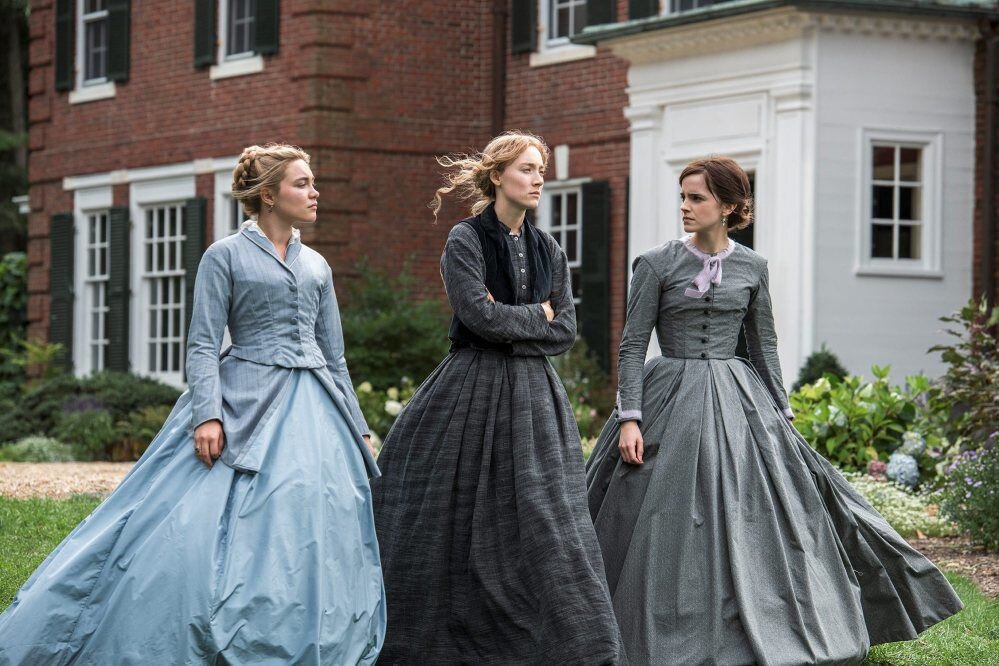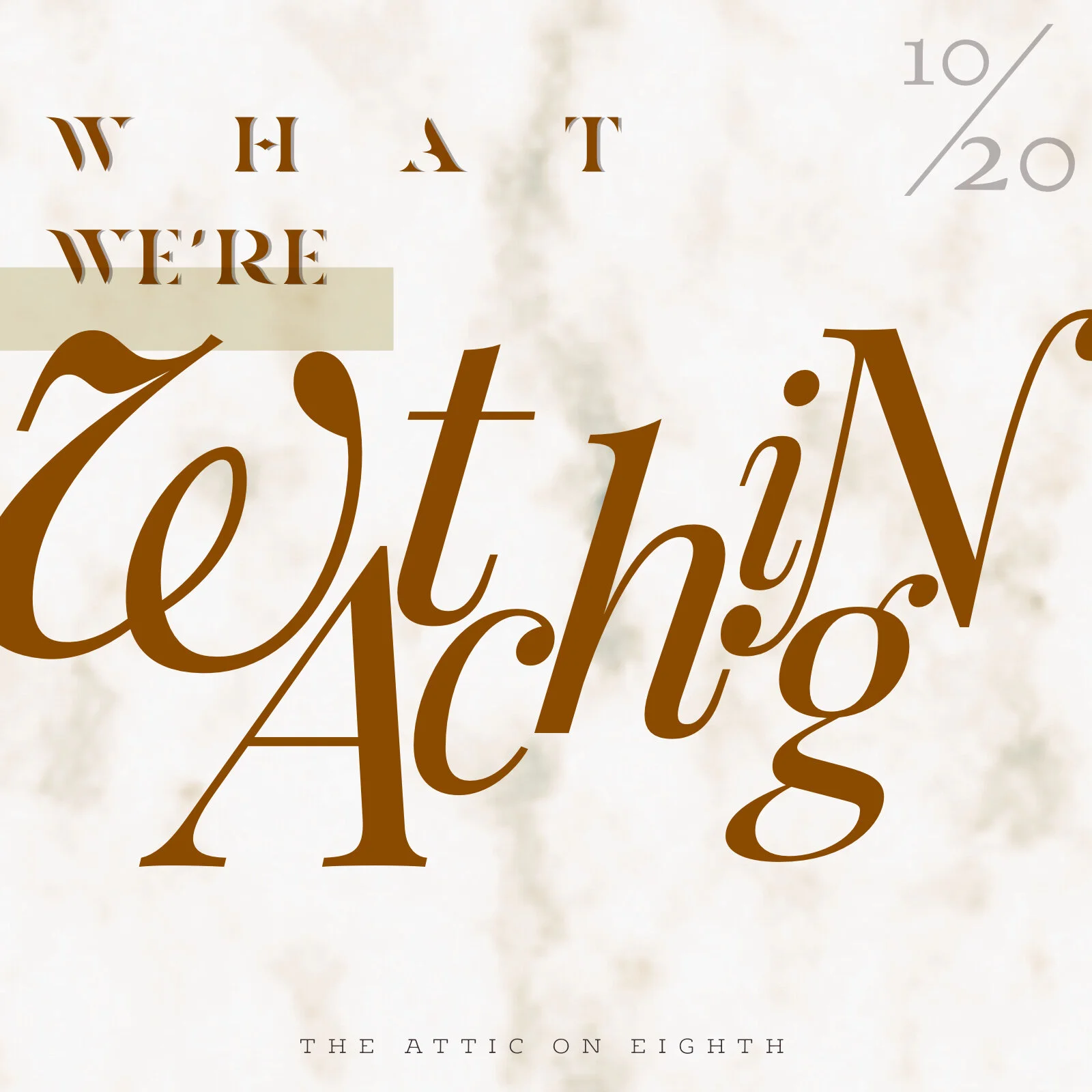Jo March for a New Generation of Little Women
Little Women (2019)
“Little Women has always, I think, had a special appeal to young women writers, but Greta Gerwig’s sincere and stylish adaptation takes things to a different, more personal level.”
In the opening scene of Greta Gerwig’s directorial triumph Little Women, Jo March (brilliantly played by Saoirse Ronan) submits her sensational stories to the publisher Mr. Dashwood for consideration on behalf of “a friend,” a ruse the old man sees through immediately. Writing still wasn’t seen as a ladylike profession in the 19th century, and as a result many women were forced into masculine or neutral pseudonyms to protect themselves and their families, including the Brontë sisters, George Sand, Mary Ann Evans, and yes, Louisa May Alcott, who published many stories under the name A.M. Barnard. Women can have a difficult time claiming not only their art, but also their talent. As a child reading the novel by Louisa May Alcott, I understood what Jo meant when she said she wished she had been born a boy. She wanted the freedom to exercise her passion and natural abilities, and the opportunity to provide for her family without resorting to traditional means of marriage. Jo March is the somewhat rare classic heroine to not only work to express herself creatively, but to make it her living.
“As a child reading the novel by Louisa May Alcott, I understood what Jo meant when she said she wished she had been born a boy. She wanted the freedom to exercise her passion and natural abilities, and the opportunity to provide for her family without resorting to traditional means of marriage.”
Little Women has always, I think, had a special appeal to young women writers, but Greta Gerwig’s sincere and stylish adaptation takes things to a different, more personal level. The focus of the film, even more so than past adaptations, is on Jo and her feelings surrounding her career and family life. Although the other March sisters’ stories are handled with care, it’s Jo’s perspective that we return to when there is a marriage or illness, and what a powerful perspective it is. Whereas the novel centered Jo, but more neutrally, the new adaptation positions her at the forefront of the story, and everything that happens to her sisters affects her and her hopes for her own future. Her sisters, in turn, are cheering for Jo even when they don’t completely understand her feelings. The level of support that her three sisters show for her writing, also present in the 1868 novel, feels more powerful and revolutionary than ever. Despite being a story that heavily concerns itself with romance and marriage, Gerwig’s film centers around the beautiful and sometimes difficult relationship between four sisters and their different dreams for their futures — not all unconnected from Jo’s creative dreams.
Amy, played with great depth by Florence Pugh, is a sort of foil to Jo. She is a fellow artist who is less concerned with money and more concerned with self expression and genius. Jo is more selfless than her sister, and it’s for that reason that making money from her writing is so important to her, somewhat paradoxically. Whereas Amy could thrive as a happily married mother painting as a hobby, Jo almost has to turn her art into a career. When Amy infamously burns Jo’s manuscript out of spite early on in the story, it hurts precisely because she’s the sister who most understands what art can mean to its creator. She is the one who perhaps best knows and understands Jo, and uses her knowledge against her. The ever-selfless Beth meanwhile — played by Eliza Scanlen — loves all of her sisters dearly but is especially helpful and meaningful to Jo. Beth is her biggest supporter, and many of the stories Jo writes are written just to make her sister smile, and Beth in turn tries to cheer her family with her piano playing. While Amy causes Jo little but annoyance and stress, Beth is a soothing figure who Jo appreciates greatly for her love and acceptance. The jump from favorite family member to muse was a natural one for Jo, who from the beginning writes from a place of love for her family.
“Writing can seem like a frivolous thing to do in the face of so much misfortune, but in fact the opposite is true – the act of creation is very brave in the midst of adversity.”
The loss of a muse can be especially devastating to an artist. Not only has a loved one gone forever, but the grieving artist has also lost a fundamental part of who they are: their ability to create. For that reason, Beth’s death is especially difficult for Jo to cope with in Gerwig’s adaptation. She is unable to write for some time after the tragedy of her sister’s loss, and is angry at her stories for being unable to save her. Her mother is concerned by Jo’s lack of desire to write and continue forward in her career, but Jo is adamant that she cannot write, and carefully burns her old manuscripts, bringing the drama back to Jo’s writing. As a hopeful young writer, I too have stopped writing when things felt too dark, too hopeless. Especially when I came out as gay, I felt and, truthfully, sometimes still feel that nobody could possibly take me and my work about the inner lives of women seriously. Writing can seem like a frivolous thing to do in the face of so much misfortune, but in fact the opposite is true – the act of creation is very brave in the midst of adversity. Gerwig’s film portrays the pain of losing the desire to create when creation has given so much strength in the past. Beth was Jo’s muse, and she was gone: there was no point in continuing on. There was no one to unconditionally love her work, to make laugh, or to financially support.
“She realizes it’s braver to create something personal, that she can take pride in, than to leave her gift dormant for the rest of her life. ”
During her grieving, Jo has an epiphany while burning her old stories, and Beth’s memory becomes her driving force to write a more serious book, the novel that becomes Little Women. She devotes herself entirely to handwriting her book, even falling asleep writing. On her desk sits a little red book opened to a page that says, “For Beth.” She lays out her novel in ever increasing chapter piles on her floor, representing all of her progress. Gerwig thus presents the way so many writers sees themselves during a fit of particularly potent inspiration, and perhaps how Alcott perceived her own writing of the novel. And while it is obviously a romanticized portrayal of the act, it feels so vividly relatable that it produced an excited anxiety in me, the same feeling I get when finishing one of my own stories. She realizes it’s braver to create something personal, that she can take pride in, than to leave her gift dormant for the rest of her life. It’s in this frenzy of inspiration that Jo persists through her grief and channels her spirited energy into her art, claiming it for herself and for Beth. Jo, seemingly resigned to the story being only for herself, tells her sisters her book is uninteresting and unimportant. Her publisher Mr. Dashwood agrees. But Dashwood’s daughters beg him for the rest of it, putting a new audience in a position of importance, away from more traditional male standards of taste and excellence. These little girls are thrilled to read a story where the women are as complicated and layered as they are. Amy, having matured greatly over the years, agrees and assures Jo that writing about a thing makes that thing more important, not the other way around.
Incredibly, Gerwig gives writing the greatest role in the story when she heavily implies that Jo doesn’t marry but instead focuses on her writing in the way that she has always desired. On screen, she marries Friedrich Bhaer only after Mr. Dashwood insists her novel’s main character marry. Jo is adamant that the heroine in fact does not, and has been rejecting the idea of marriage throughout the whole book in accordance with her convictions. And I as a viewer want her to find love, but not to settle for a man she barely knows, especially in this film version where Bhaer disappears from the story so quickly.
“I’m so sick of people saying love is all a woman’s fit for. I’m so sick of it. But I’m so lonely.”
Many ambitious women have felt this pull between love and career, frightened by the possibility that only one is obtainable. At first, Jo even seems to think love is silly and frivolous, imploring Emma Watson’s character Meg to run off with her instead of marrying. “You’ll be bored of him in two years. We’ll be interesting forever,” she says.
Jo doesn’t find the romantic love her sisters find, but as Jo watches her book being printed and bound in red leather, it’s clear how tenderly she feels about her new work. The novel doesn’t just represent her own success. Rather, it represents all the love she’s ever felt for her friends and family, and the joy that their own, perhaps more conventional but just as worthy, successes brings her. She has her book and her school. Her best friend is still in her life through his marriage to Amy, and her whole family is together and they love her and her lively spirit exactly as she is, with no expectations.
Gerwig’s Little Women brought up a memory for me I’d long forgotten. As Jo cries to her mother over what she sees as her mistake in rejecting Laurie, I remembered the first time I read Alcott’s novel. The book was important to my family, and my grandmother had been named after Amy. I was around eight years old and knew I wanted to be a writer already. Jo’s marriage, even at my young age, seemed forced, shoehorned in as the new film also shows. I’d related to Jo the whole book, and still do now, especially now that I’m out as gay and share that feeling of being different. In the cinema, I remembered my first reading when I had the realization that I would never be content, that I would sacrifice and settle and get an ending that might look happy but that wasn’t what I really wanted or hoped for. And for the last half hour or so of the film, tears wouldn’t stop streaming down my face, and I had to work to keep my crying quiet. But Gerwig fixed Alcott’s ending, rewrote it for girls like Jo, the ending that wasn’t perfect but was what the heroine really wanted. As Jo looks at her book being bound, I understood that this was a much happier, much more natural ending for women like me and Jo. She has the privilege to write her own story, and to make a living off it, too, despite her society’s reluctance to pay women writers or to look at their work seriously. Amy says, “The world is hard on ambitious girls,” but her sister finds the success she wanted all along, through her own strength and determination, and that’s much more empowering than any marriage could be, no matter how beautifully romantic or well-suited.
Camilla Danaher studies Art History and Journalism at Arizona State University. She frequents galleries and coffee shops, where she writes short stories and essays.













In a personal essay, Elizabeth Slabaugh visits the disappointments and realization of tempered dreams around traveling to Oxford after not being able to spend a semester at the university due to chronic illness.